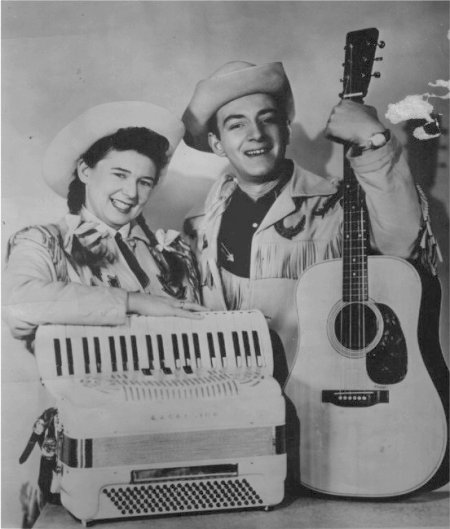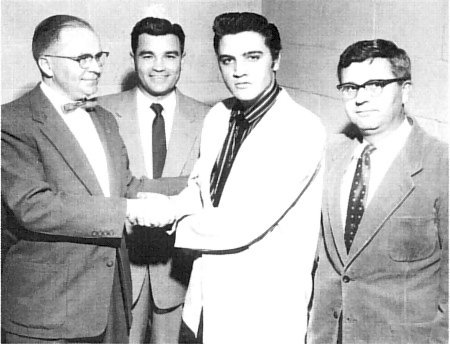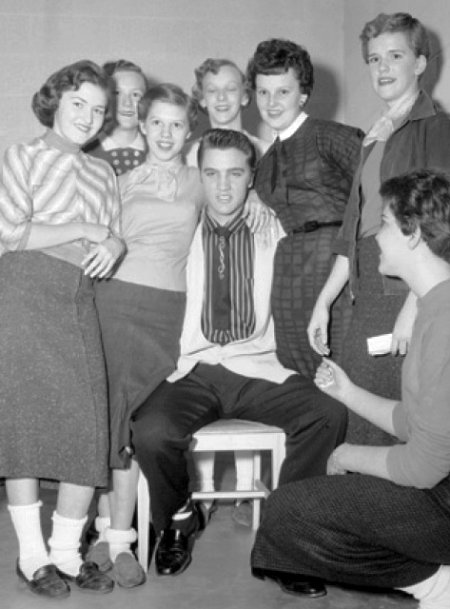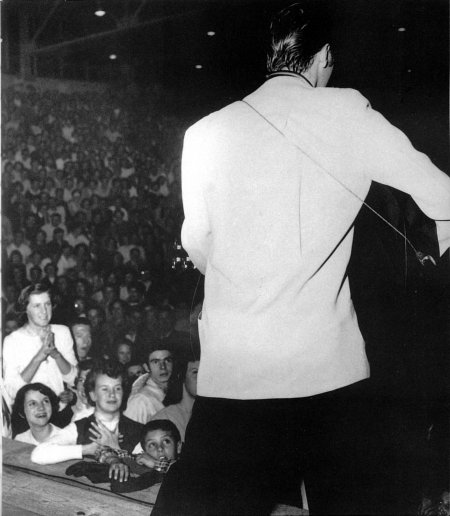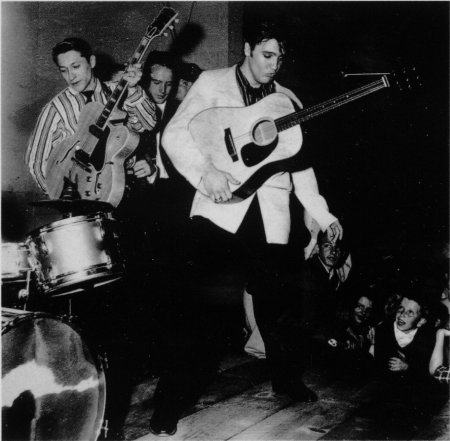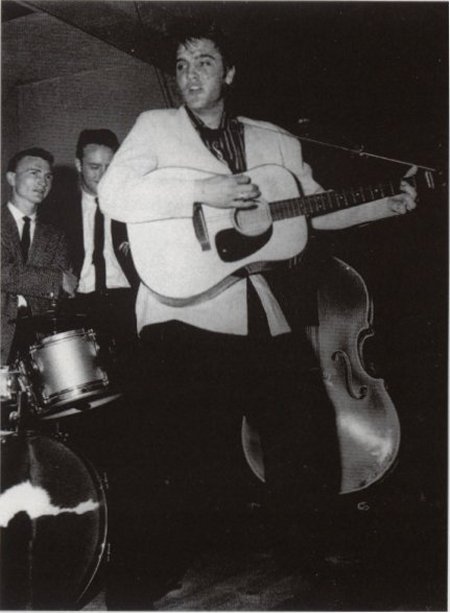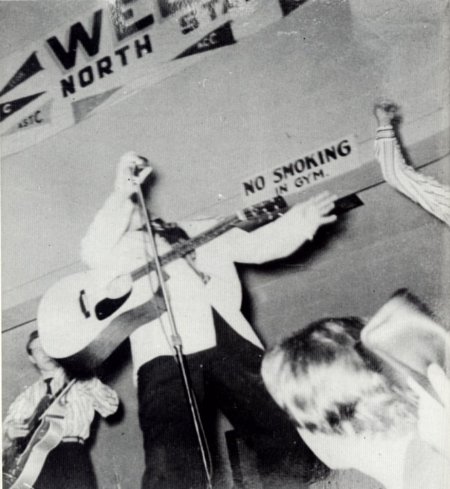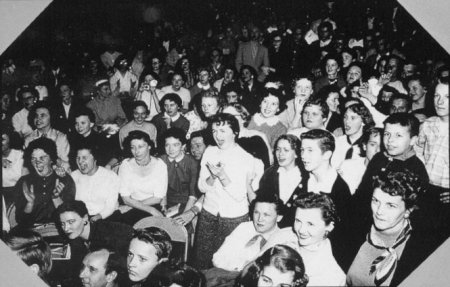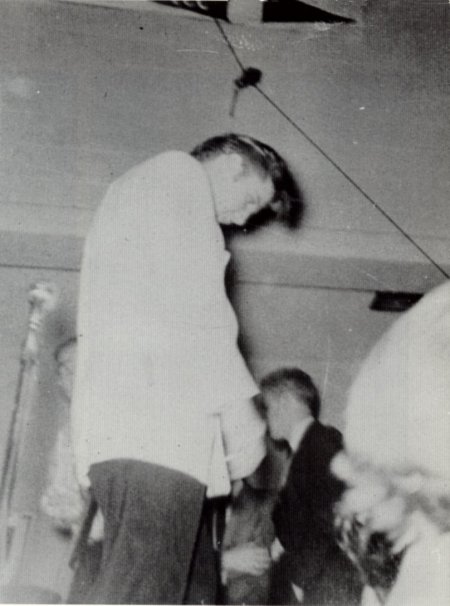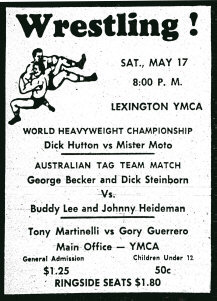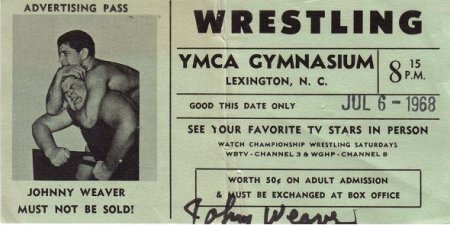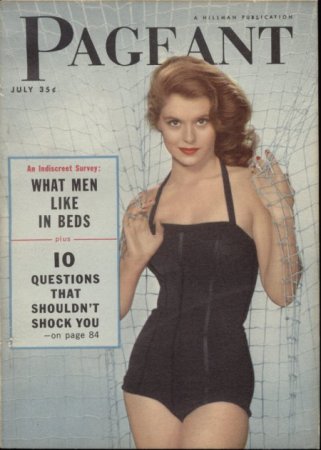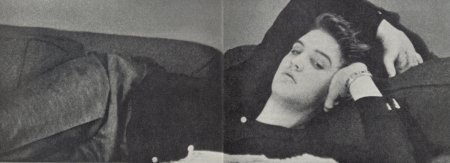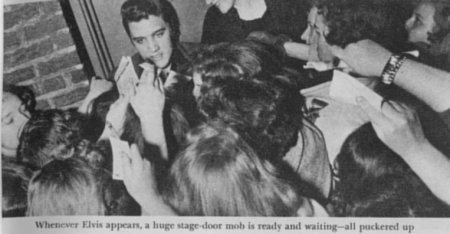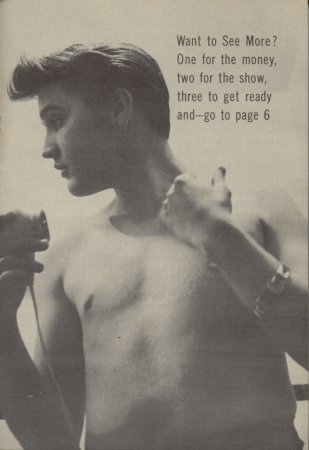 |
YMCA Gymnasium Lexington, North Carolina was named after Lexington, Massachusetts, the town where the first shot of the American Revolution was fired in 1775. That shot, figuratively speaking has since been referred to as "a shot heard round the world". The YMCA Gymnasium in Lexington, NC was built in 1954, only months before Elvis, Scotty and Bill would record at Sun in Memphis, figuratively firing another shot that would be heard around the world.
The Lexington YMCA officially started in May of 1950.
On
The YMCA gymnasium was an impressive structure for hosting wrestling events. Its design of 4,000 seats could be expanded by several hundred ringside chairs for wrestling. Advance purchase of tickets topped 1,300 before the start of the Saturday card. The final attendance of 4300 for the debut of wrestling was much more than expected, with news reports describing fans as coming from various parts of North Carolina and some adjoining states. The amount of the sales brought indications to YMCA officials and Jim Crockett of a potentially lucrative long-term business partnership; therefore other matches were planned for upcoming weeks.1 For twenty years professional wrestling was by far the dominant form of any sports or entertainment offered not only in the YMCA arena, but anywhere in the immediate area. Different types of entertainment were featured throughout the years at the Lexington YMCA. The Harlem Globetrotters, professional ice skating shows, college basketball tournaments along with various acts of the theatrical world appeared in the arena. Only once did a performance draw an audience comparable to the largest crowd attending wrestling.1
About a week prior to the upcoming Eddy Arnold concert, Colonel Parker contacted the YMCA‘s general secretary, Carl Link, and told him that Eddy Arnold would not be able to appear. Mr. Link notified Howard Fite, the chairman of the YMCA‘s committee and told him. When Dr. L.C. Harpe, the Civitan's president was informed, he contacted Colonel Parker who confirmed that Eddy Arnold would not be appearing, but that he was sending a young singer named Elvis Presley instead.2 Dr. Harpe expressed concern about whether they would make any money on an unheard singers performance. Colonel Parker told Dr. Harpe, "I’ll tell you what. I'll give you fifty percent of the gate or I’ll give you a guaranteed flat fee of two hundred dollars." Not having heard of Elvis, Dr. Harpe told Colonel Parker, "We'd better take the two hundred dollars. At least that’s a sure thing."2
On
March 15, 1956, The Dispatch reported: New Singing Sensation Elvis Presley, great new singing sensation who has skyrocketed to the
top practically overnight, will appear in person headlining a big show
Wednesday, March 21, at the YMCA-Gymnasium for one big show at 8:00. Appearing with him are Mother Maybelle and the Carter Sisters, featuring
June Carter; Rod Brasfield, Hal and Ginger and others. It's hard to believe that to the Civitan Club Elvis was an "unheard singer", especially considering that by then he had appeared on National Television (the Dorsey's Stageshow) and had already made several sold out appearances in the area within the last year. As early as the 12th, the Dispatch was running blurbs in the paper announcing his appearance at the 'Y', though they mistakenly reported that he had made appearances on the Ed Sullivan show, which he wouldn't until the following September. Nonetheless, as the day of the show approached, his popularity was evident and their fears unfounded when on the 20th, the day before the show, the Dispatch wrote:
Advance sale tickets are moving at a fast clip and a big attendance should be on hand to "rock and roll" with Elvis Presley, youthful singing sensation at the
YMCA tomorrow night.
Appearing on the bill along with the acts that Elvis had regularly toured with like the Carters and Rod Brasfield was the husband and wife act of Hal and Ginger Willis, an act originally from Canada who had relocated to Nashville in 1955. According to Hal, Hank Snow introduced them to Colonel Parker, who hired them to tour with Elvis which provided them with some recognition. Hal recorded his first session on Atlantic Records in 1956 and had an early Rock ‘n Roll hit with My Pink Cadillac. According to James Prince, the boys arrived in Lexington early in the morning on the day of the show with Elvis not feeling well. After checking into the New Lexington Hotel on North Main Street and sleeping for several hours they went to Leonard's Cleaners for laundry and Elvis also got a lesson in tying Windsor knots from the owner, Don Leonard. Back at the Hotel Elvis was examined by Dr. Milton E. Block, diagnosed with a mild case of the flu and given two prescriptions.
The show, in the meantime, had sold out and they had turned away more than 2000 more people. Dr. L.C. Harpe, Don Leonard and Haynes Sherron were waiting at the YMCA for Elvis. They were to serve as his bodyguards downstairs and in his dressing room. About 6:30 Elvis arrived and the men met him in the parking lot. The girls began closing in on him as he emerged from the car. The men were able to get him inside and down to his dressing room. Elvis then gave Dr. Harpe a note from Omar Davis. The note instructed Elvis, to see and talk to Dr. Harpe for a few minutes. Dr. Harpe asked Elvis to autograph a program for him. A photographer snapped a picture of Elvis posing with his body guards. While in the dressing room Elvis asked Don Leonard to help him with his necktie one more time. Mr. Leonard helped Elvis tie the Windsor knot and adjust it one last time.2
In the hallway outside Elvis's dressing room it was becoming more hectic. Colonel Parker opened the door and said they would like to make some pictures and he started picking out some girls to pose with Elvis. He brought in cousins Edith and Bonnie Kennedy of High Point, Harriet Gilyard of Winston-Salem and Linda Shaver, Janice Snyder, Lorraine House, Bobbie Smith and Barbara Hull of Lexington. The lucky girls eagerly went inside. Elvis’s cousin Gene Smith stood at the edge of the on looking crowd, awed by the adoring fans.2
One of the girls in the picture, Barbara Smith Lohr, says she got backstage because her aunt was a friend of photographer "Scoop" McCary and he got them backstage. Barbara talked to Elvis and asked some questions. She remembers the different girls talking to Elvis about how the teenagers related to him. Elvis said he enjoyed the attention, but he wasn‘t used to it yet. Barbara described Elvis as being very shy, very nice and very polite. He said “ma'am" to all the ladies. Barbara got his autograph before she left.2
Lorraine House Furr says she just pushed her way in to meet Elvis. She remembers the boys as being jealous of the attention Elvis got from the girls. Lorraine said the girls took turns kissing Elvis for the picture. She forgot to get an autograph.2 Barbara Hull Gates states she got to Elvis’s dressing room because she was with a crowd of girls with a lot of nerve. Barbara remembers she didn’t talk much to Elvis, she just looked at him. She says Elvis kissed all the girls. She described Elvis as being very nice and polite. Bonnie Kennedy Price says she had seen Elvis about a year earlier at the Center Theater in High Point and had gone crazy over him. Bonnie, her cousin Edith and a group of girls from High Point came to site Elvis perform again.2
The review in the Dispatch the following day was as follows, A whirlwind blew into Lexington last night, attracted a record turnout of spectators at the spacious YMCA arena, and left this morning on the way to Richmond, Va., and another show. The whirlwind is Elvis Presley, 2l-year-old singing sensation of the nation who has what many experts describe as the "biggest drawing power in the entertainment world at present. Elvis came to Lexington yesterday morning slept most of the day in a hotel, woke up to find he was running a fever, called a local physician for treatment and went on as scheduled at the YMCA last night.3 "I have a mild case of the flu," the "Mr. Dynamite" of recording fame said last night in his dressing room. "I guess I should rest some but my friends are coming out to see me and the show must go on." And the show did go on. Elvis in natty attire, went to the stage to feature the second part of an all-star review. He had to be ushered from the dressing room by policemen who forced their way through scores of young girls seeking autographs, souvenirs or just a look at "their boy."3
As the young man from Mississippi who has skyrocketed to fame practically overnight took his position on the stage sighs and cries of the younger set, dominating the estimated attendance of 4,800 could be heard for many blocks. Elvis slouched his shoulders, wiggled them, spread his legs, wiggled them, and the sigh and cries grew even louder. When he talked it was louder cries. When he strummed his guitar the noise got louder and when he sang bedlam broke loose.3 Using all types of intricate motions as he delivered his songs, many of them top-selling RCA Victor hits, Elvis showed his audience what has gained him fame as the new "bobby-soxers" favorite of the nation, the young man who pulls in record crowds everywhere he appears. Backed by a good band Elvis sang on, wiggled on and danced on. Young voices rang high from the audience — "Sing to me, Elvis," shouted many a young miss. The din was so loud most of the time that one could hardly hear Elvis' voice but it kept up. All he had to do was to appear. That was what the crowd came for from points all around Lexington. The 4,800 estimated set a new unofficial attendance record for the YMCA.3
Presley headed an all-star show that brought some other favorites to Lexington as well, the Carter Sisters, Mother Mabelle, Rod Brasfield and others. The crowd was immense and crowded into the stands and chairs brought in for the occasion. Chairs were added to those already on hand but still people stood. The box office was closed as the crowd continued to press in. There were some misunderstandings about reserved seats but it was pointed out that tickets were sold for reserved sections and not reserved seats. With such a big attendance it's hard to handle the crowd, YMCA officials pointed out today. They also said that the Y's only part in selling tickets was in some assistance offered last night. No advance tickets were sold at the Y and the program was one that was sponsored by the visiting show which leased the building for the night.3 Young Presley, feeling a little low because of his illness, still greeted as many persons as he could. Elvis is a shy fellow who says he's ever thankful to the public for their "taking him in." "I'll never forget the folks who have made this rise possible, especially my mom and dad," he stated. "It just appears to be a dream to me. I hope I can continue to please the public." Elvis, although a hero to thousands of bobbysoxers, says he has no one girl. "Haven't had time to think about that," he explained in telling of one-night stands and other commitments he must keep up along with recordings.3
Tonight Elvis is in Richmond. Tomorrow night it will be Washington. On Saturday night he appears on the Jackie Gleason show on television. Sunday he will board a plane for Hollywood where he is to receive a screen test for a new Hal Wallis movie, "The Rainmakers," starring Burt Lancaster and Katharine Hepburn. After five days in Hollywood he comes back to the midwest for more one night stands. "it's a tough life but it's worth it," states Elvis.3 In the neighboring town of Salisbury, The Salisbury Post reported, Heaven was a big auditorium in Lexington last night for a few thousand teen-agers. A dreamy-eyed young man by the almost, impossible name of Elvis Presley, the country's newest singing sensation, was the attraction (to use the word mildly). In an appearance that couldn't have lasted 15 minutes Elvis sent the bobby-soxers in the packed YMCA into a frenzy.4
Far be it from this writer to say whether or not the man can sing because the screams of the predominantly female crowd drowned out everything. But whatever it was, to use the words of the popular music world, the major portion of the audience was not only "sent," man, it was gone. Gone. GONE.4 Less than six months ago, few people had even heard the name Elvis Presley. But that was before a disc jockey worked him in for a spot on the Dorsey brothers big Saturday night television production, "Stage Show." The Dorseys are bewilderedly shaking their respective heads. Five times since he first appeared his sweeping popularity has caused the Dorseys (who know a good thing when they see it) to bring Elvis back for reappearances.4
Presley who just turned 21 years of age is a tall handsome young man who sweeps his hair back to the rear of his head to modernized ducktail fashion, has a set of even white teeth (if that means anything) is of average weight and has a style with a microphone that is all his own. Sinatra sort of leaned into his. Johnny Ray looked like a Golden Gloves boxer who just before he fell flat on his face was trying to find his. But this Presley boy wonder. The way he makes love to the thing, caresses it, is something to see, but it is also something that could not accurately be described by a household publication of any sort.4 And on top of all that, he handles a guitar that must be reinforced because of the treatment it gets. And then Presley steps back, sweat pouring from his lace, his breathing heavy. With his shoulders twitching, hips swaying and legs moving in perfect rhythm, the house comes down. It one could put his finger on any particular thing that Presley does that has caused his sudden rise, it must be those body gyrations. Each tune he really got carried away with himself through his twisting and turning any audience applause needle would have popped right out of the glass.4
The four policemen who had to surround the boy to keep him from being torn apart said the crowd of over 5.000 was the biggest ever assembled for any attraction in the spacious new YMCA there. The place seats around 5,000 and last night saw them standing in the aisles. They had converged from every city and town within 50 miles of Lexington. Presley is just about as bewildered about the whole thing as everybody else. But, nervously chomping on a piece of chewing gum before he went upstairs and onstage last night, Presley told this reporter, "I love it!"4 He said he decided on singing as a career about a year and a half ago. He had always liked it, but it was not until he and a small group got together and recorded a now-famous hillbilly song called "That’s All Right Mama." The song went over big, and Presley has been at it ever since with the same combo, his and another guitar, a bass fiddle and a set of drums. Presley takes the hill-billy out of the hill-billy and in its place puts "rock and roll." He said his style just comes natural. How does it feel to be the idol of the bobby-soxers? Presley grinned sheepishly, shrugged and mumbled something to the effect that he himself can‘t quite realize what has happened, it's all been so fast. In fact, it appears that it hasn't thoroughly soaked in yet.4
Presley calls Memphis home, but he was born and reared in Tupelo, Miss. According to the publicity agents, he started singing when he used to listen to the "plaintive" songs of the field hands. He is an only child, and daddy was a truck driver who is not doing much of anything these days. He and mama are tickled pink, though, happy for their son. The Presleys moved to Memphis, the land of the blues, about eight years ago. Male reaction appears to be about nil to Presley. One man could be heard saying after it was all over, "I just can't see lt."4
A freelance writer by the name of Jim Poling who began an assignment yesterday to do a feature on Presley for Pageant Magazine simply threw up his hands in amazement. He plans to stick with Presley and try to find the answer. Pageant wants the story around June.4 Standing quietly to the corner of the dressing room as the hundred or so bobby-soxers were trying to smash their way inside was a young man by the name of Gene Smith. Gene and Elvis are first cousins and grew up together. He drives Elvis' long Cadillac. The rest of the time he stands around wearing an expression that he would like to unobtrusively pinch himself every few seconds to really see if the thing is true. And then Gene fades aside as the screeching youngsters surge on Elvis for a touch or an autograph.4
Presley, like the troupers of old, went on last night even though he had been suffering during the day from a touch of flu. It he had failed to appear, there is some doubt that there would have been anything left of the Lexington "Y." Also on the program were some of the Grand Ole Opry stars, but they were lost in the Presley.4 Current and hot: “Heartbreak Hotel," "Blue Suede Shoes," "Tutti-Frutti," "I Got a Gal" and "That's All Right Mama." By the way, nobody fainted last night. But many red-faced youngsters with tears streaming from their entranced eyes, would undoubtedly have done so if the program had lasted another five minutes.4
On May 17, 1958 the World Heavyweight Wrestling Championship match was held at the YMCA. Dick Bourne of the Mid-Atlantic Wrestling Gateway, said it was the first world title match held there and a big deal to be sure, as the title was such a big deal then. The title defended that night in Lexington has a lineage that goes back into the early 1900s.
The YMCA continued to feature top level sports and entertainment into the early 1970s. Professional wrestling, however, was the major long-term attraction during those years, since the YMCA was the major structure of the region before the Winston-Salem and Greensboro Coliseums were built.1
According to Jimmy Holhouser, the Executive Director at the Lexington 'Y', the YMCA was renamed the J. Smith Young YMCA in 1993 after undergoing a three million dollar renovation project. Mr. Young was the CEO of Lexington Furniture Industries in Lexington. His three children have all been involved in the Y and Mr. Young and his wife gave a sizeable amount of money to help us reach our goal. The current facilities were totally renovated in 1994-95 and again in early 2001. The gymnasium was part of the original building built in the early 50’s and is still very much a part of the facilities today. Renovations included removing the bleachers and also all the upper windows and A/C has been installed. They have some of the wood from those bleachers in different areas of the facility in honor of some of the history from events that were held in there including Elvis. On March 21, 2006, 50 years to the day after Elvis' only appearance in Lexington, the Dispatch published an article that contained the remembrances of some of the local residents that had attended the concert.
"Our mothers were interested in seeing Maybelle Carter," recalled Glenda
Hartley, then a junior at Reeds High School, who went with her good
friend, Janet Bame. "Of course, my friend and I were interested in
seeing Elvis."
Hartley laughed as she recalled Elvis' notorious hips and the reaction
of the parents in the attendance. "I had never seen anything
comparable," Hartley said. "Our mothers were shocked."5 page added August 15, 2008
All news clippings and 1956 ads from the Dispatch are
courtesy Dewey Snider and the Lexington Public Library, Lexington, NC.
The Salisbury Post review is courtesy Rowan Public Library, Salisbury,
NC. All
wrestling ads from the Dispatch are courtesy Dick Bourne of the Mid
Atlantic Wrestling Gateway and Wayne Brower. Special thanks to Brian
Petersen's "Atomic Powered Singer" for the leads on the
1956 reviews.
1 excerpt from Lexington YMCA 1954 to 1959 - A Historical Overview © by Wayne Brower
|
|
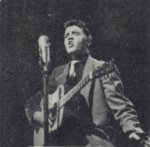 Elvis Presley GO, CAT, GO by Jim Poling
|
|
|
|
Elvis Aron Presley has got it made, there can’t be any question of that. Eighteen months ago he was a truck driver in Memphis. Today, he can walk on any stage in the country, strum his guitar, belt out: Well, it’s one for the money, Two for the show. Three to get ready, Now go, cat, go!... * and know that sheer rockin’ and rollin’ pandemonium will ensue. Because the cats really dig this boy— and if you aren’t a cat, mister, you just aren’t hip. No popular singer in recent memory has created a sensation that even approaches the furor this newest riot-inciter has stirred up. The blasé stage doorman of CBS-TV’s New York Studio 50 says, "I haven't seen anything like it since the heyday of Johnny Ray and Frankie Sinatra, and I‘m not sure I saw it then.” He speaks with feeling, because each time the young baritone guest-starred on the Dorsey Brothers' Stage Show he had to barricade his portals against the thousands of Presley fans who stormed the theater with each appearance. One of Presley’s colleagues adds, “Seems like all this boy`s got to do is jes' show hisself an' the gals git to thrashin' around and pantin’ like mountain mules." And he isn't exaggerating. Elvis showed himself one recent evening in the lobby of his hotel in Lexington, N. C., where a bevy of his quivering idolators had gathered to pay him homage. As he appeared, one girl screeched in ecstasy, "Oh, it’s him." and fell to the floor in a dead faint. And, as she swooned, the hotel clerk groaned, "Damn, that’s the third today." Some girls, of course, are made of sterner stuff. But even they stagger away from a face-to-face encounter with their troubadour glazed of eye and lyrical of tongue. ("'The hottest bedroom eyes ever and the most kissable mouth there is.") They rhapsodize over his dark, flowing mane and even seem to find an aphrodisiac quality in his sideburns, where a humming bird could nest with ease. As for his clothes—"Oh, that living doll is just the sharpest !" —they have to be seen in compatible color to be believed. But, then, almost everything about Elvis and his career verges on the improbable. In January, 1955- just before his twentieth birthday —he earned $25 the night he made his professional debut at the Eagle’s Nest Club, in Memphis. Today, just 18 months later, he’s booked solid, at fees ranging from $1,000 to $2,500 a night; his album is selling faster than RCA Victor can manufacture slip-covers for it; one of his hit records, Heartbreak Hotel, sold 122,000 the same week Perry Como's Hot Diggity sold 74,000; and he has just been screen-tested by Paramount. In his first full year as a professional he can expect to gross about a million. Elvis will only net about half of what he earns; like a champion boxer, he’s been “cut-up" by assorted agents, personal managers and other “ten-percenters.” And he'll need all he gets. In his brief career he has already acquired several diamond rings, a motorcycle, pool tables, enough clothes to stock a haberdashery store, and six Cadillacs, three of which have been wrecked. He’s also built his parents a new house, helped his kinfolk, and persuaded his daddy to retire from his paint factory job at the venerable age of thirty-nine. His old friends say success hasn‘t changed him a bit, it’s just the novelty of suddenly having so much money that confuses him.
Elvis is experiencing this novelty probably because of the paradoxical fact that he is the only vocalist of record whose singing has to be seen to be fully appreciated. His voice is a compelling, throbbing baritone and he can impart an insistent, sensual rock 'n’ roll beat to any song he attacks. But Elvis goes even further. Properly, or improperly, speaking, he is a rock ’n‘ roll ’n’ writhe singer, because completely uninhibited motion is an intrinsic component of his singing and his success. His gyrations are usually described as: actin’ like his jeans was on fire, shaggin’, wigglin’, jazzin’ it up, etc. These are all evasive ways of saying that Elvis accompanies his singing with the motions usually associated with the sex act. In burlesque parlance, they're known as bumps and grinds—but a strip-teaser who tried to emulate Elvis would probably end up in the hoosegow. Because he writhes with such an unnatural frenzy he is frequently accused of taking dope or being drunk. Neither is true. As his manager says, "That boy don’t need a stimulant, he needs soothin’ syrup." Elvis has also been accused of selling sex with cold, deliberate calculation. But two of the three musicians in the combo that backs him up—electric guitar, drums and bass fiddle—have been with him from the beginning and they both insist that, unlike a strip-teaser, he doesn’t put on a studied, rehearsed act. Scotty Moore, guitar player, says, "We weren't even conscious of his grinds at first; you know, most rock n' roll singers jump it up a bit. Then we got some comments that worried us, and Elvis tried to quit it. He sang without moving for a while, but his voice stopped moving, too. If he’d kept on standing still he’d be back driving a truck today. Fact is, he can't sing good without squirming." When an elderly lady recently asked Elvis if he wasn’t ashamed of his act’s vulgarity his answer was, “M’am, I ain’t being vulgar. I'm jes' jumpin’ with the beat, ’cause the jumpin’s in me. How in the peapickin’ world kin I help it if I go wi-uld when I sing? That's the way I feel." And when Elvis goes wi-uld—man, he’s catnip to all the cats, even including the tomcats. Surprisingly, there is only one recorded instance of his role of L'homme fatale arousing overt resentment among his male worshipers. He took a solid right to the nose in Lubbock, Texas, one night. But his assailant fled in a waiting car before Elvis could recover from the blow, which was wise of him. Because Elvis-six-foot and l82—pounds——is a very good boxer. He used to travel with a sparring partner (Red West, a former Golden Gloves lighter) who finally quit because he wasn’t rugged enough to stand the pace of touring with Elvis.
The female of the species has turned out to be a far greater threat to Elvis’ well-being than the male which has probably been something of a shock to him, because if there is anything he likes better’n a purty girl it’s a prettier one. It has, of course, always been a tribal custom of the bobby-soxer to show reverence for an idol through the laying on of hands. But with Elvis they don’t stop there. They lay on, and then start ripping. Frenzied souvenir hunters, gouging in the process, have stripped him practically to the buff so often that he is now resigned to these bodily attacks. "They got me down to my shorts one night in Texas," he says. "An’ in Charlotte t'other night they got me down to my britches an' got one cuff off'n them 'fore the police got me in the car." He asks for police protection wherever he appears, but inevitably, the size and frenzy of the stage door mob is underestimated and too few officers are sent to cope with it. Women are at him constantly. His telephone rings around the clock. He's deluged with an average of 3,000 letters a week—2,000 proposing marriage, 100 blaspheming him, and the other 900 just proposing. One moronic Shreveport, La., mother even wrote asking him to save her daughters life because, "She threatens to commit suicide if she doesn’t bear your child." Girls are waiting in the hotel lobby when he arrive: in a town, and a. cavalcade of honking automobiles follows him for miles when he drives off to his next engagement. Girls sneak up fire escapes or bribe bellhops to let them into his room. In Austin, Texas, he discovered a girl in his room shining his shoes. She announced that she was his self-appointed slave, but refused to reveal her name or address. Elvis and his traveling companion, Cousin Gene, had to take her wallet from her by force to get the information they needed to ship her back home to San Antonio. (Cousin Gene carries Elvis' money for him. He was pressed into service recently after Elvis absentmindedly left $600 behind him in a dressing room.) Elvis has brought a good deal of his gal-trouble on himself. He is impulsive and thoughtless; on a whim, he may buy a newsboy’s entire bundle of papers and, an hour later, walk out of a restaurant without tipping his waitress; or give a $25 Christmas present to an out-of-work musician he barely knows and not even send a Christmas card to the men in his own combo. A silly gesture he made a few months ago still continues to haunt him. A girl in line for an autograph begged, "Please kiss me, too, doll." So he kissed her ("She was purty and she was puckered up.") Naturally, every other girl in the line made the same demand of him—and then hurried off to spread the gladsome word of his promiscuity over the teenage grapevine. And ever since that first false move he has found the girls puckered up and waiting in every town in which he’s appeared. As a result, his lips are by now almost calloused and the hours he has spent scrubbing lipstick from his face may possibly equal the total man-hours spent cleaning New York’s streets after a snow storm. But, despite his months of training, Elvis still hasn't learned to pace himself in the clinches. Sometimes he just pecks. Other times, he goes all out. This, of course, is a mistake. It makes for an uneven performance and leaves him open to critical attack. Only a few weeks ago, in Washington, D. C., a girl left his embrace saying, "I don’t know what's happened, but he was kissing a lot better in Winston-Salem." What had happened was that the strain was beginning to tell on Elvis. He may be the dreamboat of the dungaree-set, but he is also a taut, nervous young man with more talent than sense. And no dreamboat who has to go through a daily routine of rockin', rollin’, writhin’ ‘n’ osculatin’, can hope to steam through such an exhausting schedule on a couple of hours sleep a night, and highly infrequent meals, without eventually foundering. And so no one in his entourage was surprised when Elvis collapsed from nervous exhaustion, recently, after a performance in Jacksonville, Fla. He was rushed to the hospital (his fans even tried to invade its emergency room), given a sedative and put to bed. But he was back at his hotel by six the next morning. And when Cousin Gene asked him what the cotton-pickin' hell he thought he was doin', Elvis sighed, “I come back here to get me some sleep. Man, I’m weary of being pawed over and puckered at. Them dadgum nurses wouldn't give me a minute’s peace." He continued his tour, adding vitamin pills and penicillin shots to his meager diet, but a little bit of the zip was gone. Being puckered at 24 hours a day, it seems, takes a lot out of a man who hasn’t specifically trained for the event, and Elvis was never conditioned for the ordeal.
When he graduated from Memphis’ Humes High School, in 1953, he was just a kid from a poor family, ambitious to get a job as a policeman when he was twenty-one. True, he had been singing and picking at a. guitar for as long as he could remember. And he had won a first and a fifth prize in amateur singing contests, and had sung in two high school variety shows. But, otherwise, his youth was ordinary.
The turning point came the day he went to the Sun Record Company,
Memphis, and made a record at his own expense ($4) to give to his
parents as a present. Sam Phillips, head of Sun Records, heard him make
the recording and told Elvis he might call him back someday to try a
commercial record. In September, 1954, Sam called. That first recording
date was almost Elvis' last. Phillips worked with him for three hours,
trying unsuccessfully to get a satisfactory rendition of a slow ballad,
I Love You Because, and then wearily called a "I was jes' horsin’ around," Elvis recalls. “Singin’ the way I liked to sing fer my own amusement, but wouldn't have thought of singin’ fer people. An' Mr. Phillips said, ‘Let's tape that an' see how it sounds.' Well, it turned out one of the most peculiar sounds ever heard, and I thought people would laugh at me fer that kind of caterwaulin.' But Mr. Phillips said the public was lookin' fer something different—an‘ I guess this was it." His recording of That's All Right, with Blue Moon Of Kentucky on the flip-side, was an immediate, solid hit. Three months after it was issued, in January, 1955, Elvis gave up truck driving to take an engagement singing at the Eagle’s Nest Club. Two weeks after his club debut, he made his first professional stage appearance at the Overton Park Shell, a Memphis amphitheater where he stole the shows from five seasoned, headline acts. He was then invited to appear the following Saturday night on Grand Ole Opry in Nashville. It was an unprecedented invitation. Grand Ole Opry is to country music what the old Palace was to vaudeville, and performers usually have to prove themselves throughout the country at large before they can hope to be invited to appear on its sacrosanct stage. But Elvis went to the Opry, walked out on a stage for the second time in his professional life, took on the best the world of country music had to offer —and topped them all. After that, had it made, at least as far as the South and Southwest was concerned. The disc jockeys began pushing his records, bookings began pouring in—and Elvis suddenly found himself clutching the tail of a soaring rocket that was carrying him to stardom and spewing wads money in his astounded face.
RCA Victor purchased his recording contract from Sam Phillips last
November. But Elvis was never seen by a national audience until just
this past January 28th, when he made the first of his six
guest-appearances on CBS-TV’s Stage Show. However, the returns
were in even before he was given national exposure. The cats had already
adopted him as their own, thanks to the disc jockeys, and when the cats
dig you, man, you‘re really in the money, Of you may never know another
moment’s peace in this world, either, but that doesn’t Not long ago, down in Lexington, N, C., he sought sanctuary from his clamoring fans in the local pool hall. It was restful there, and quiet, under a soiled wall sign that read, "Please, No Loud Profanity." And with only the clicking balls to disturb the serenity of the moment, Elvis bravely faced the future. "I guess I gotta admit them little ol' gals do bug me, sometimes," he said, "but I’m a goin' to go on meetin' my people so long as I got the strength. 'Cause, as I see it, you’re only in business as long as they're aggravatin’ you." He chalked his cue, then grinned like a tall ol' possum. "Know what a real purty one said to me last night?" he asked. “She said, 'Jes’ touch me, honey, an` I’ll frame the spot in gold.' Man, this is livin.' " At which point Cousin Gene, who had the nine-ball lined up for the corner pocket, flubbed his shot.
This article by Jim Poling first appeared in the July 1956 issue of Pageant Magazine - Volume 12, Number 1
|
||
|
All photos on this site (that we didn't borrow) unless otherwise indicated are the property of either Scotty Moore or James V. Roy and unauthorized use or reproduction is prohibited. |
||
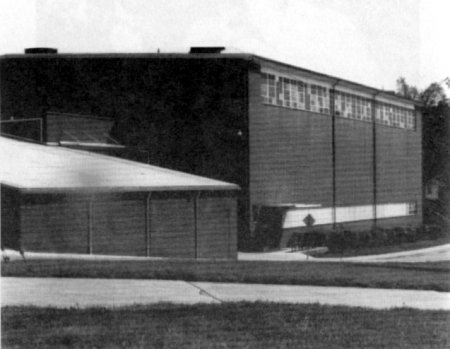
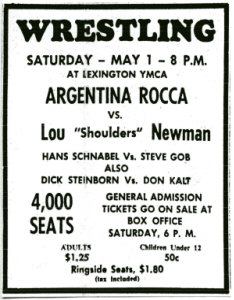 In the April 22, 1954 edition of The Dispatch, a Lexington newspaper, an article appeared with the headline: Top Notch Wrestling Bouts Here. The story described a visit to Lexington by well known matchmaker Jim Crockett who agreed to put on a wrestling show at the YMCA in May.
The article described Crockett telling the reporter that he will stage a first class event, and if sufficient support was evidenced, other big shows would follow.
The first professional wrestling matches were held at the YMCA Gymnasium on Saturday, May 1, 1954. The show was headlined by Argentina Rocca versus Lou Newman.1
In the April 22, 1954 edition of The Dispatch, a Lexington newspaper, an article appeared with the headline: Top Notch Wrestling Bouts Here. The story described a visit to Lexington by well known matchmaker Jim Crockett who agreed to put on a wrestling show at the YMCA in May.
The article described Crockett telling the reporter that he will stage a first class event, and if sufficient support was evidenced, other big shows would follow.
The first professional wrestling matches were held at the YMCA Gymnasium on Saturday, May 1, 1954. The show was headlined by Argentina Rocca versus Lou Newman.1 In
a booklet called "The Day Elvis Came To Town" by Lexington
resident James D. Prince, James wrote that a show at the 'Y' featuring
country singer Eddy Arnold was initially booked by
In
a booklet called "The Day Elvis Came To Town" by Lexington
resident James D. Prince, James wrote that a show at the 'Y' featuring
country singer Eddy Arnold was initially booked by 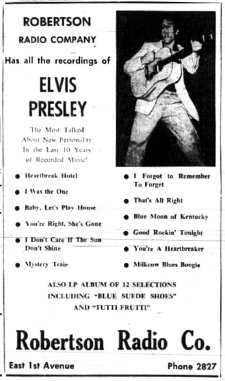
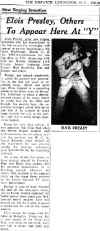
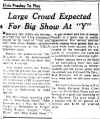 Elvis Presley To Play - Large Crowd Expected For Big Show At "Y"
Elvis Presley To Play - Large Crowd Expected For Big Show At "Y" 